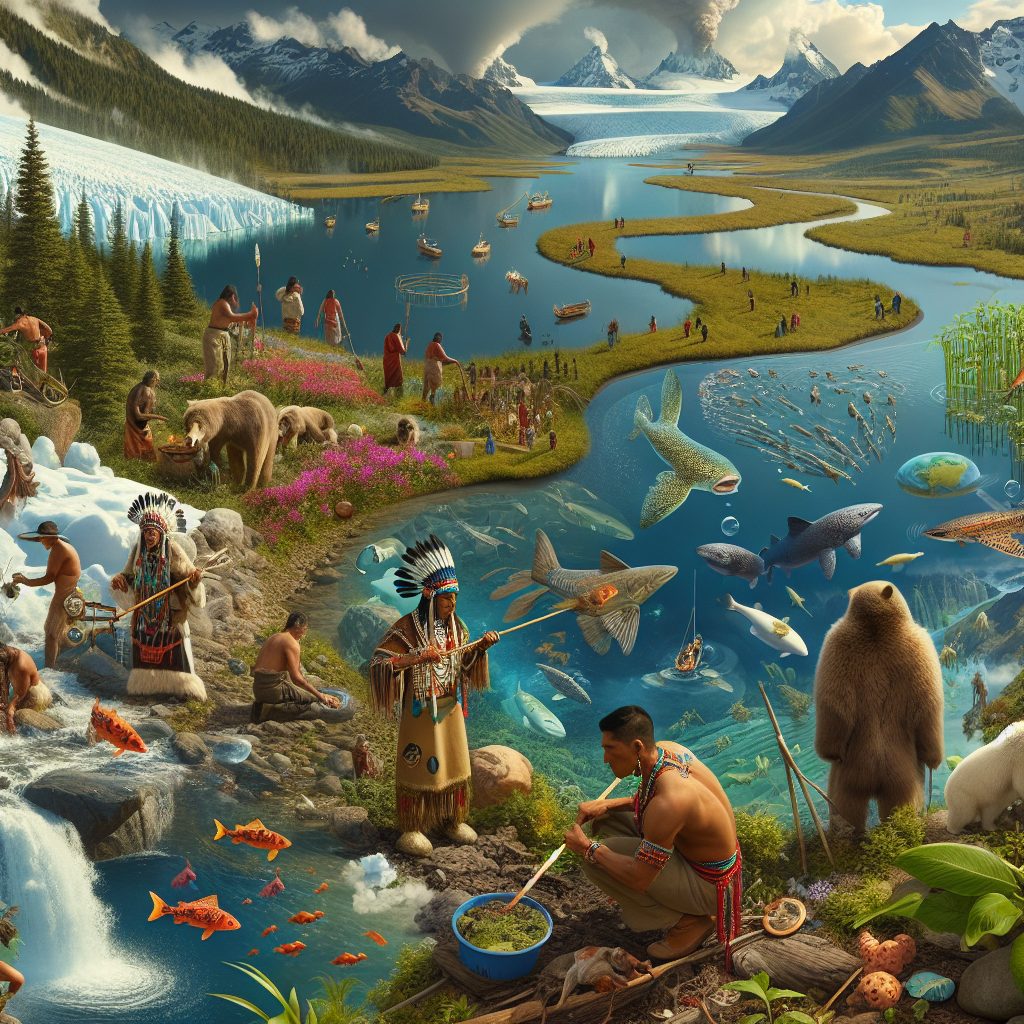
Indigenous perspectives on climate change are becoming increasingly important given the impacts directly experienced by Indigenous peoples across the world. Globally, many Indigenous peoples are experiencing the effects of climate change in ways disproportionate to the rest of the population. Indigenous peoples are often on the frontlines of climate change, frequently living in geographic areas with heightened risks of extreme weather and other impacts of a changing climate. Indigenous peoples are also constrained from traditional access to land and resources due to changing climates and increased risk of floods, hurricanes, drought, and wildfires. Climate change unquestionably has a disproportionate impact on Indigenous communities, which have often been robbed of their land and rights in the past.
In addition, Indigenous communities are uniquely equipped to lead climate mitigation and adaptation assessments given their localized knowledge. Traditional ecological and land-use practices may be an effective means to mitigate and adapt to climate change. Indigenous people have had a long-standing commitment to protecting the environment that is intertwined with their culture and spiritual beliefs, and this in turn can lead to the development of innovative solutions to address issues related to climate change. The notion of sovereignty encompasses both the individual rights of Indigenous people and their collective voice- and the success of climate change mitigation initiatives relies on the meaningful recognition of both. Recognizing that Indigenous perspectives are essential to the global conversation is an important step in creating equitable solutions to the global climate crisis.
Key Takeaways
1. Indigenous communities of North America have been adversely affected by climate change through worsening droughts, fires, floods, permafrost thaw, and increasing temperatures.
2. Traditional Indigenous approaches to climate change include teachings for respectful relationships between humans and the natural world; principles of interconnectedness, balance, equity, and sustainability; and strategies to minimize dependence on external forces for food and fuel.
3. Indigenous people’s unique perspectives on land stewardship, responsibility for the land, and knowledge of traditional ecological practices make them essential in confronting ecological degradation caused by climate change.
4. Expanding existing Indigenous ways of knowing and incorporating them into broader initiatives to address global climate change are critical to mitigating the negative impacts on Indigenous livelihoods, health, and future generations.
5. Indigenous interpretations of climate change must receive full consideration, and Indigenous participation and free, prior and informed consent should be emphasized in planning and decision making related to climate change at local, state, and federal levels.
What Are the Indigenous Perspectives on Climate Change?
Definition of Indigenous Perspectives on Climate Change
Indigenous perspectives on climate change refers to the ways Indigenous people view, understand, and explain the impacts of climate change from the traditional knowledge of their cultural heritage. Indigenous perspectives combine spiritual understandings and knowledge of the physical environment to explain climate change, alongside scientific theories and principles.
Indigenous Communities and Climate Change
Indigenous communities are particularly susceptible to the effects of climate change and its impacts on the environment. Climate change accelerates the degradation of landscapes, reduces water availability and agricultural productivity, and disrupts traditional livelihoods. Climate change also disproportionately affects Indigenous communities due to their closer connection to land and the environment.
Impacts on Indigenous Peoples
The impacts of climate change on Indigenous communities have been described as “devastating”. Indigenous peoples have faced the impacts of climate change in the form of food insecurity, access to clean water, displacement, loss of land and forced migration. As a result of climate change, many Indigenous communities have been put in precarious situations, where they are vulnerable to the effects of extreme weather events like floods, droughts, and storms.
Indigenous Responses to Climate Change
Indigenous communities are responding to climate change in a variety of ways, including developing strategies and initiatives to adapt to the changing environment. They are also using their traditional knowledge to develop climate change policies, taking into account their interconnected relationship with the land and their deep understanding of their environment.
Indigenous Strategies for Protecting the Environment
Indigenous communities are employing a number of strategies to protect the environment, such as the re-induction of traditional farming practices, the implementation of sustainable land management techniques, and the development of renewable energy sources. These strategies provide Indigenous communities with an alternative to help mitigate the negative impacts of climate change.
Indigenous Communities and Climate Change Negotiations
Indigenous peoples are increasingly being included in climate change negotiations, such as the United Nations Framework Convention on Climate Change and the Paris Agreement. This involvement gives Indigenous communities the opportunity to voice their concerns and provide input into decisions about the future of the planet.
Helpful Tips for Learning More about Indigenous Perspectives on Climate Change
- Read books and articles written by Indigenous authors about the subject.
- Look for events and conferences focusing on Indigenous perspectives on climate change.
- Talk to family and friends in Indigenous communities about climate change.
- Keep up-to-date with the latest climate change news from Indigenous perspectives.
- Visit Indigenous territories and talk to people living in the region.
- Learn about the traditional environmental management practices of Indigenous communities.
What Are Indigenous Perspectives on Climate Change?
Indigenous perspectives on Climate Change are rooted in the traditional beliefs, values, and knowledge of Indigenous peoples of the world. These perspectives are informed by their collective experiences with local, regional, and global changes in the environment and their ability to adapt and adjust to them. These perspectives are based on their understanding and recognition of the reciprocal relationship between humans and the environment, which recognizes that humans are a part of nature and are inextricably part of a larger web of life.
How Are Indigenous Perspectives On Climate Change Different?
Indigenous perspectives on climate change are based on the fundamental understanding that humans are connected to the environment and that our actions can have a direct impact on the environment. Indigenous peoples have a holistic approach to managing natural resources and recognize the interconnectedness of ecological systems. They emphasize the importance of maintaining balance and harmony in the environment through traditional stewardship practices, and recognize the role of cultural and spiritual ceremonies in sustaining this balance.
What Are The Impacts of Climate Change on Indigenous Peoples?
The impacts of climate change on Indigenous peoples are numerous and varied. These impacts include changes in weather patterns, loss of traditional territories, changes in wildlife and resources, and displacement of peoples. Many Indigenous peoples are disproportionately affected by these impacts, as they depend on traditional territories and resources for their livelihoods and cultural practices.
What Has The Government Done To Address Climate Change?
Recent efforts taken by the government to address the issue of climate change have included the Paris Agreement, which sets out a baseline for countries to work towards in order to reduce global emissions and slow the rate of climate change. The U.S. also signed the document and committed to a specific set of pledges for climate action, including commitments to the Clean Power Plan, methane emissions standards, and investments in renewable energy. The government has also recognized the importance of Indigenous perspectives on climate change and has included them in their efforts to address the issue.
What Role Do Indigenous Peoples Play in Addressing Climate Change?
Indigenous Peoples have an important role to play in addressing climate change. They have an intimate knowledge of their local environments and are often better equipped to develop climate resilient strategies that work. Indigenous Peoples are creating new solutions to adapt to the changing climate, such as traditional stewardship practices, integrating their culture and past experiences into knowledge about the environment, and using innovative technologies such as satellite and remote sensing.
What Are Some Examples Of Indigenous Solutions To Climate Change?
Indigenous Peoples in Canada are deploying a variety of climate-resilient solutions to address the effects of climate change. Examples include traditional stewardship practices, such as fire management, reducing emissions from hunting and harvesting, and the careful integration of local knowledge and traditional spiritual practices into the management of natural resources. In other parts of the world, Indigenous Peoples are engaging in projects such as permaculture, agroforestry, and the adoption of renewable energy sources. Indigenous Peoples are also responding to climate change with innovative technologies such as satellite and remote sensing.
What Is The Importance Of Indigenous Knowledge In Addressing Climate Change?
Indigenous knowledge has the potential to play an important role in slowing the rate of climate change. This knowledge is built on many generations of experience and is based on a holistic understanding of our relationship with the environment. Indigenous knowledge can help us to better understand the impacts of climate change in our local environment and provide innovative solutions to address the issue. This knowledge is also increasingly valued by scientists as well as policymakers as an important source of insight into how to address climate change.
How Can Indigenous People Access Resources For Climate Solutions?
Indigenous peoples have access to a variety of resources to help find solutions to the climate crisis. Organizations around the world are working to support Indigenous Peoples and their communities with funding, technical assistance, and resources. Additionally, the United Nations recognizes Indigenous Peoples as having the right to self-determination and has pledged to support Indigenous Peoples in their efforts to implement climate-resilient solutions.
How Can We Support Indigenous Communities In Advocating For Climate Solutions?
One way to support Indigenous communities in advocating for climate solutions is to increase the visibility of their voices in the public sphere. This can be done by raising awareness of their contributions and knowledge, amplifying their stories of resilience, and urging decision-makers to take action. Other ways to support Indigenous communities include providing access to resources for advocacy and education, increasing access to financial resources, and advocating for the respect of Indigenous rights to land, resources, and self-determination.
What Are the Benefits Of Incorporating Indigenous Perspectives On Climate Change?
Adopting Indigenous perspectives on climate change can help to improve our understanding of the environment and our collective ability to respond to it. Indigenous perspectives can offer valuable insights into how to best manage and protect the environment, by recognizing the relationship between humans, the land, and the environment. By incorporating Indigenous perspectives into our current strategies and solutions for addressing climate change, we can create more sustainable and equitable solutions that work for everyone.
Final Thoughts
Indigenous perspectives on climate change provide an important insight into the interconnectedness between humans and the environment. Indigenous peoples have an intimate knowledge of the environment and the potential to develop innovative climate-resilient solutions. It is critical that we incorporate their perspectives into our actions to address the climate crisis, and that we recognize and support Indigenous peoples in their efforts to protect the environment.
While Indigenous perspectives are essential to improving our understanding of the environment, it is important to remember the unique circumstances that Indigenous peoples face, such as impacts on their traditional territories and resources. It is also important that we ensure that Indigenous peoples have access to the resources and support they need to engage in advocacy and develop their own climate change solutions.



